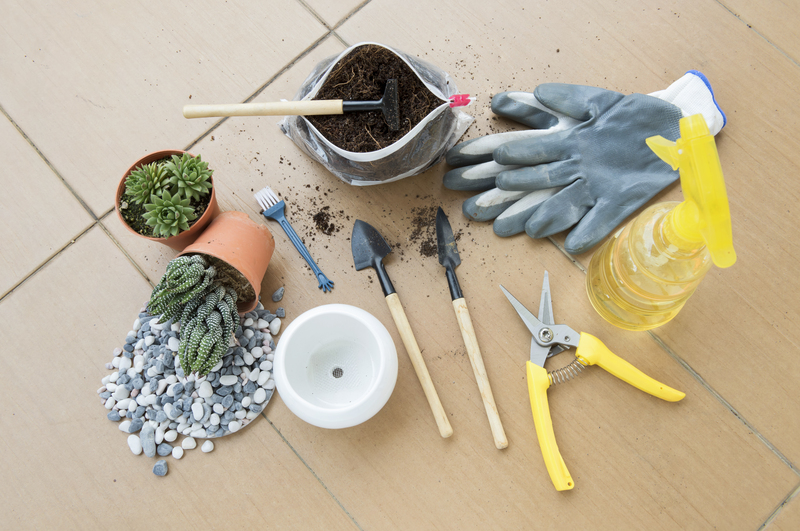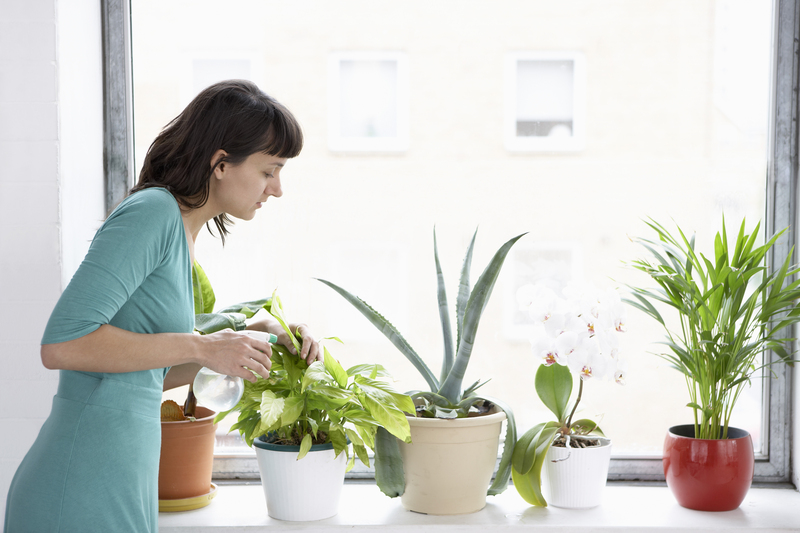Transform Your Garden with 3 Essential Weed Control Tactics
Posted on 13/08/2025
Transform Your Garden with 3 Essential Weed Control Tactics
Is your once-beautiful garden overrun by stubborn weeds? Maintaining a thriving, attractive landscape can be challenging when relentless weeds compete for space, nutrients, and sunlight. Mastering effective weed control strategies is the secret to reclaiming your outdoor haven and preventing those pesky invaders from coming back.
In this comprehensive guide, we'll introduce you to the 3 best weed control tactics that will help you regain control of your flower beds, vegetable patches, and lawns. Discover powerful organic and preventative methods designed for easy maintenance and lasting results. Whether you're a seasoned horticulturist or a beginner gardener, these weed control solutions will empower you to transform your garden into a lush, weed-free paradise.
Why Effective Weed Control Matters
Weeds do more than just spoil your garden's looks. They aggressively compete with your ornamental plants, flowers, and vegetables for:
- Water and nutrients in the soil
- Precious sunlight necessary for healthy growth
- Valuable space for roots and foliage
If left unchecked, weeds can weaken your prized plants, attract pests, and increase disease risk. By implementing the right weed management techniques, you preserve your garden's health, appearance, and productivity.

1. Start with Mulching: Suppress Weeds from the Start
How Mulch Works as a Weed Barrier
Mulching is one of the oldest and most effective ways to suppress weed growth naturally. By covering the soil with organic or inorganic material, mulch creates a physical barrier that:
- Blocks sunlight from reaching weed seeds
- Reduces weed germination and growth
- Retains soil moisture and improves soil health
Organic mulches (such as bark chips, straw, shredded leaves, or compost) are eco-friendly and improve soil fertility as they decompose. Inorganic mulches (like landscape fabric, gravel, or stones) offer long-term weed protection and low maintenance.
How to Apply Mulch Properly for Maximum Results
- Remove existing weeds thoroughly from the targeted bed or border.
- Spread a 2-3 inch layer (5-8 cm) of your chosen mulch evenly across the soil surface, keeping it clear from the base of plants and trunks.
- Replenish mulch each year to maintain effective coverage and appearance.
Pro Tip: For stubborn areas, combine landscape fabric with a layer of organic mulch. This double barrier is highly effective at preventing persistent weed issues in flower beds and paths.
2. Preventative Tactics: Outcompete Weeds with Smart Planning
Dense Planting and Ground Covers
Weeds thrive in open soil with plenty of space. By planting densely and utilizing attractive ground cover species, you leave little room for weeds to take hold. Some excellent choices include creeping thyme, sweet woodruff, lamium, or ajuga.
- Use a grid planting system for annual crops to minimize weed-prone gaps.
- Select vigorous perennials or ground covers for ornamental beds.
- Consider "living mulch" by interplanting shallow-rooted vegetables or herbs between taller crops.
Crop Rotation and Companion Planting
Rotating crops and incorporating companion plants can reduce weed pressure and disease cycles in vegetable gardens.
- Avoid planting the same crop in the same spot year after year.
- Use fast-growing, shading crops (like squash or beans) to quickly cover soil and crowd out weeds.
- Include fragrant or allelopathic (weed-suppressing) plants such as marigolds or nasturtiums in your design.
Effective weed control starts with smart planning. By proactively designing your garden for plant density, minimal exposed soil, and healthy competition, you naturally limit weed establishment and spread.
3. Mechanical & Manual Weed Control: Stay Diligent for Best Results
Hand Pulling: The Old-Fashioned but Proven Method
Manual weeding is still the most targeted weed control tactic. With the right approach, hand-pulling is especially effective for:
- Annual weeds and seedlings before they set seed
- Weeds growing among valuable plants and tight spaces
- Small gardens or landscape beds
How to Hand Pull Weeds:
- Pull weeds after rain or watering, when the soil is moist and roots release easily.
- Grasp weeds low to the ground and pull gently but firmly to remove the entire root system.
- Use a hand fork, hoe, or dandelion weeder for tap-rooted or stubborn weeds.
- Dispose of weed debris properly; avoid leaving uprooted weeds on the soil surface where they may reroot or spread seeds.
Cultivation Tools and Techniques
For larger areas or persistent weed infestations, mechanical weed control is essential:
- Hoes: Use a sharp hoe to sever weeds at or just below the soil surface. Draw hoes, Dutch hoes, and collinear hoes each serve unique purposes for cutting weeds in different garden zones.
- String trimmers: Useful for quickly clearing weedy edges or paths.
- Flame weeders: Ideal for non-flammable paths and driveways, using propane flames to wilt weed foliage without chemicals.
For lawns, maintain healthy, dense turf through correct mowing, fertilization, and irrigation to keep weeds at bay. Regular maintenance is the foundation of ongoing weed prevention in gardens and landscapes.
Natural Weed Control Solutions: Safe and Eco-Friendly Alternatives
Organic Herbicides and Home Remedies
If you need additional support in your weed management strategy, consider these non-toxic options:
- Spot-treat weeds with vinegar solutions but avoid contact with desirable plants.
- Use boiling water to kill weeds in cracks and hardscapes.
- Spray horticultural-strength fatty acid herbicides for rapid control of young weeds.
These methods are best for localized weed issues or areas where mechanical or mulching solutions are impractical. They're kinder to soil ecology, pollinators, and pets compared to synthetic chemicals.
Maintaining a Healthy Soil Ecosystem
Don't overlook the role of soil health. Well-balanced, fertile soil favors robust plant growth and naturally resists large-scale weed invasions. Add organic compost, avoid unnecessary soil disturbance, and test your soil to ensure optimum pH and nutrition for your chosen plants.
Common Weeds and How to Identify Them
Learnt to recognize the most common garden weeds in your region. This lets you select the best removal strategy and apply targeted weed prevention tactics. Some typical offenders include:
- Dandelions (Taraxacum officinale): deep tap-root, bright yellow flowers
- Crabgrass (Digitaria spp.): grassy, spreading annual in bare soil or lawns
- Bindweed (Convolvulus arvensis): twining vine with white/pink morning-glory flowers
- Creeping Charlie (Glechoma hederacea): ground-hugging, scalloped leaves, purple flowers
- Chickweed, groundsel, Canada thistle, etc.
Once you identify problem weeds, you can apply the most suited weed control technique for effective and lasting results.
Best Practices for Lasting Weed-Free Gardens
- Always remove weeds before they set seed to prevent future outbreaks.
- Inspect your garden regularly, especially after rain or in spring when new weeds emerge rapidly.
- Reapply mulch each season and keep plantings dense.
- Use a combination of physical, cultural, and organic weed suppression strategies for maximum effect.
- Encourage healthy soil and plants, as strong growth naturally crowds out weeds.
Patience and consistency are key. By integrating these three weed management tactics--mulching, preventative planting, and diligent manual/mechanical removal--you'll see year-on-year improvement and a transformation in your landscape.

Frequently Asked Questions About Weed Control
What is the most effective mulch for weed control?
No single mulch suits every garden, but organic bark chips, shredded wood, or straw all perform well at suppressing annual weed growth and enriching soil. For permanent paths or heavily infested areas, use landscape fabric with a decorative stone or gravel cover for unbeatable long-term weed prevention.
How often should I weed my garden?
Inspect your garden once a week during the active growing season, and remove weeds as soon as they appear. Small, frequent weeding sessions are far more effective--and less overwhelming--than tackling large, well-established infestations.
Are chemical herbicides safe for home gardens?
While some selective herbicides offer fast results against specific weeds, many contain chemicals that may harm desirable plants, soil microbiology, pollinators, pets, or children. Opt for organic, eco-friendly weed killers and always follow label instructions closely.
Can I compost weeds?
You can compost most pulled weeds, but avoid adding mature weeds that have gone to seed or invasive roots (like bindweed or nutsedge) to your pile, as this may spread them throughout your garden when using the compost later.
Conclusion: Transform Your Garden, the Smart Way
Take charge of your garden with these essential weed control tactics: block weeds with proactive mulching, crowd them out through intentional planting and ground covers, and stay on top of outbreaks with regular manual or mechanical weeding. By combining these weed prevention and management strategies, you'll enjoy a healthier, low-maintenance, and beautiful landscape season after season.
Ready to transform your garden? Begin today and see the difference--because the best weed-free gardens are built on knowledge, vigilance, and a passion for flourishing plants.
Latest Posts
Grow Your Privacy with These 9 Fast-Growing Hedges
The Ultimate Guide to Herb Garden Mastery
Elevate Your Outdoor Experience With Stunning Garden Seating



